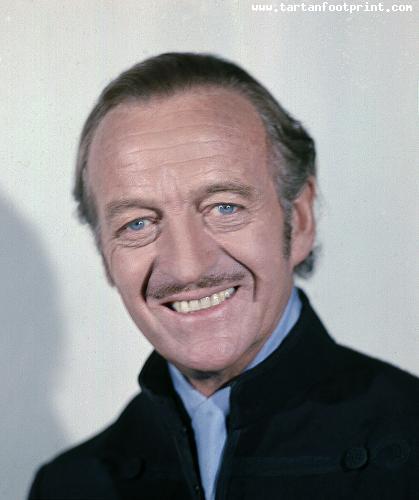You seem to be using an older version of Internet Explorer. This site requires Internet Explorer 8 or higher. Update your browser here today to fully enjoy all the marvels of this site.
August 31, 2018 by Alexander Meldrum
David Niven, (1909-1983) – Actor
James David Graham Niven (/'n?v?n/; 1 March 1910 – 29 July 1983) was an English actor, memoirist and novelist.
His many roles included Squadron Leader Peter Carte...David Niven, (1909-1983) – Actor
James David Graham Niven (/'n?v?n/; 1 March 1910 – 29 July 1983) was an English actor, memoirist and novelist.
His many roles included Squadron Leader Peter Carter in A Matter of Life and Death, Phileas Fogg in Around the World in 80 Days, and Sir Charles Lytton ("the Phantom") in The Pink Panther.
He won the Academy Award for Best Actor for his performance in Separate Tables (1958).
Born in London, Niven attended Heatherdown Preparatory School and Stowe before gaining a place at the Royal Military College, Sandhurst.
After Sandhurst, he joined the British Army and was gazetted a second lieutenant in the Highland Light Infantry.
Having developed an interest in acting, he left the army, travelled to Hollywood and had several minor roles in film. He first appeared as an extra in the British film There Goes the Bride (1932).
From there, he hired an agent and had several small parts in films from 1933 to 1935, including a non-speaking role in Metro-Goldwyn-Mayer's Mutiny on the Bounty.
This brought him to wider attention within the film industry and he was spotted by Samuel Goldwyn.
Upon the outbreak of the Second World War, Niven returned to Britain and rejoined the army, being recommissioned as a lieutenant.
In 1942 he co-starred in the morale-building film about the development of the Supermarine Spitfire fighter, The First of the Few (American title Spitfire), which was enthusiastically endorsed by Winston Churchill.
Niven resumed his acting career after his demobilisation, and was voted the second-most popular British actor in the 1945 Popularity Poll of British film stars.
He appeared in A Matter of Life and Death (1946), The Bishop's Wife (1947) with Cary Grant, and Enchantment (1948), all of which received critical acclaim.
Niven later appeared in The Elusive Pimpernel (1950), The Toast of New Orleans (1950), Happy Go Lovely (1951), Happy Ever After (1954) and Carrington V.C. (1955) before scoring a big success as Phileas Fogg in Michael Todd's production of Around the World in 80 Days (1956).
Niven appeared in nearly a hundred films, and many shows for television. He also began writing books, with considerable commercial success.
In 1982 he appeared in Blake Edwards' final "Pink Panther" films Trail of the Pink Panther and Curse of the Pink Panther, reprising his role as Sir Charles Lytton.
Early life
James David Graham Niven was born in Belgrave Mansions, London, to William Edward Graham Niven (1878–1915) and his wife, Henrietta Julia (née Degacher) Niven.
He was named David after his birth on St. David's Day, 1 March. Niven often claimed that he was born in Kirriemuir, in the Scottish county of Angus in 1909, but his birth certificate shows this was not the case.
David Niven's mother, Henrietta, was of French and Welsh ancestry. She was born in Wales, the daughter of army officer William Degacher (1841–1879) who was married to Julia Caroline Smith, the daughter of Lieutenant General James Webber Smith.
Niven's maternal grandfather, William Degacher, was killed in the Battle of Isandlwana (1879), during the Zulu War. Born William Hitchcock, he and his brother Henry had followed the lead of their father, Walter Henry Hitchcock, in assuming their mother's maiden name of Degacher in 1874.
David Niven's father, William Niven, was of Scottish descent; his paternal grandfather, David Graham Niven, (1811–1884) was from St. Martin's, a village in Perthshire.
William served in the Berkshire Yeomanry in the First World War and was killed during the Gallipoli campaign on 21 August 1915. He was buried in Green Hill Cemetery, Turkey, in the Special Memorial Section in Plot F. 10.
Niven's mother, Henrietta Niven, remarried Sir Thomas Comyn-Platt in London in 1917. Graham Lord, author and biographer, suggested in Niv: The Authorised Biography of David Niven, that Comyn-Platt and Mrs.
Niven had been having an affair for some time before her husband's death. Furthermore, some believe that Sir Thomas may well have been David Niven's biological father.
This supposition has some support among Henrietta's children. A reviewer of Lord's book stated that its photographic evidence showing a strong physical resemblance between Niven and Comyn-Platt "would appear to confirm these theories, though photographs can often be misleading."
David Niven had three older siblings:
Margaret Joyce (born in Geneva, Switzerland, 5 January 1900 – 18 November 1981)
Henry Degacher ("Max"; born in Buckland, Berkshire, 29 June 1902 – March 1953)
Grizel Rosemary Graham (born in Belgravia, London, 28 November 1906 – 28 January 2007).
Go to Wikipedia for full History.
In this photo:


